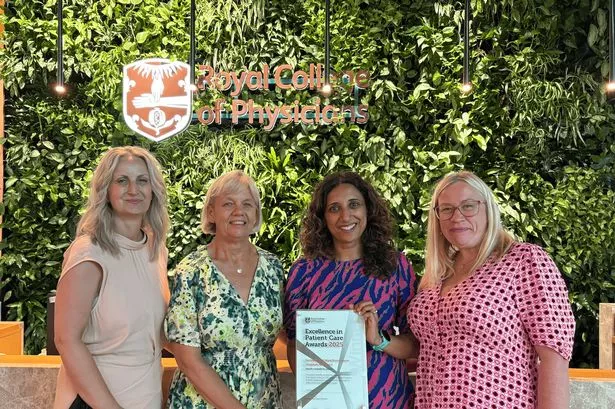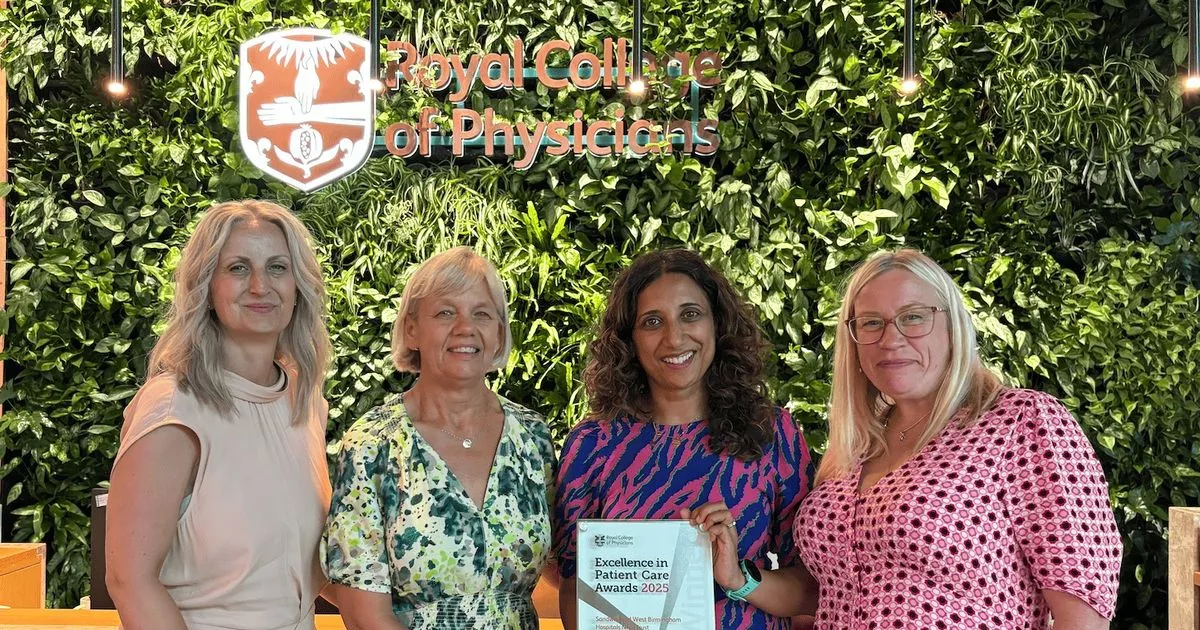The Midland Met Hospital aims to improve life chances for the people it serves as well as keeping them healthy Marsha Jones, Jayne Dunn, Dr Sarb Clare and Emma Loosley from the Midland Metropolitan University Hospital with their Excellence in Patient Care award. PIC: Sandwell and West Birmingham NHS Trust.
Marsha Jones, Jayne Dunn, Dr Sarb Clare and Emma Loosley from the Midland Metropolitan University Hospital with their Excellence in Patient Care award. PIC: Sandwell and West Birmingham NHS Trust.
“Our tag line is to improve the life chances of our people. Not just making sure they survive but have a good, quality life.”
The Midland Metropolitan University Hospital proudly boasts the tagline ‘more than a hospital’ as it not only looks to provide the best healthcare to the people it serves but also enhances the area by addressing inequalities and boosting economic opportunities.
And less than a year after it finally opened in Smethwick, the Midland Met is being recognised for doing just that having scooped the Health Inequalities Award at the Royal College of Physicians Excellence in Patient Care Awards 2025 last month.
READ MORE: 24/7 mental health texting service launched to help support Birmingham and Solihull people
It serves around 500,000 people in Sandwell and West Birmingham – areas which suffer with high levels of deprivation.
Dr Sarb Clare, Deputy Medical Director and Acute Medical Consultant at Sandwell and West Birmingham NHS Trust, said the hospital is a catalyst for regeneration in the area.
This includes redeveloping the City Hospital site in Birmingham, where 750 new affordable homes will be built.
Run-down buildings around the hospital site are to be regenerated into mixed-use, including retail space.
A new bus service connecting Sandwell to the city centre has been opened up, as have cycle lanes.
A learning campus is being built on the Midland Met site and will open at the end of this year, enabling nursing students from Sandwell College and the Wolverhampton and Aston universities to train, study and work there.
The new site also features an art gallery, community garden and a Youth Space for those aged 13 to 21.
We need to talk about knife crime
Kids aged 12 are being killed here in Birmingham. Our children need action, and they need it now.
We’ve spent three months investigating the root causes of knife crime to understand the risks our kids face.
We spent time with those on the front line for our exclusive report, Deep Cuts. Read here to see exactly why we’re pushing for these changes:
1. Free after-school clubs
When school ends, kids become vulnerable to the streets
2. More talk
Would you know if your child was being exploited by a gang?
3. Social media controls
Violence. Gangs. Bullying. Kids need shielding from the online dangers4. Tougher sentences for knife possession
There has to be a deterrent for young people5. Real punishment for weapon sellers
Unlimited fines for those selling knives to underage kids
Dr Clare said: “Midland Met encompasses us trying to address inequalities.
“We treat around 500,000 people and we have the highest level of deprivation. Deprivation is scored on the Index and Multiple Deprivation and we’re ninth (city) and 12th (Sandwell) within the UK.
“So we’re very poor. When they measure deprivation, they don’t just measure how bad your health is but also how bad your education is, how bad your skills are, crime, living environment and income.
“What people don’t understand is if you want to address health inequalities, you can’t just say ‘ok, sort out the health’. It’s all interlinked.
“There’s no point sorting out health if they are living in damp housing or can’t get education or a job.”
She added: “40 per cent of our children live in poverty in Birmingham. It’s horrific. 25 per cent of our people smoke, 25 per cent are obese and 15 per cent are alcoholics.
“50-60 per cent of our people are non British so their first language is not English.
“Everyone around the world comes to the hospital can’t communicate, they’re vulnerable and they don’t know how to access health care.
“During Covid, it is now recorded the population around City Hospital were the hardest hit in terms of death and generationally as to what happened to them – they lost their income, their jobs and so forth.
“The people who went to work were the people who couldn’t isolate – they were the taxi drivers, shop owners, bus drivers. They were the ones who got sick and died.
“I see a lot of people who forgo their wealth because they have to get money for food for their kids.
“They will miss appointments, they will not come to hospital when they are unwell because they have to go to work.”
“These are the people living in our communities. We need to address it in a multi-prong effect through housing, education and so forth.
“This is where ‘more than a hospital’ comes in. It’s responsibility of every single one of us to make sure all the jigsaw pieces come together.”
And Dr Clare added improvements should be seen over the next five to 10 years.
She said: “Smethwick should be a completely different place too in terms of housing and employment.
“I always describe Midland Met as a beacon of hope for local people because the physicality of it should say to them ‘this is for you’.
“We know people like them are neglected and no one talks about them. The poor are always left behind but this has been done for them because they need it the most.
“Our tag line is to improve the life chances of our people. Not just making sure they survive but having a good, quality life.
“It’s been great to be part of this project because we are doing something about it. We can make a difference and we are making a difference.”
